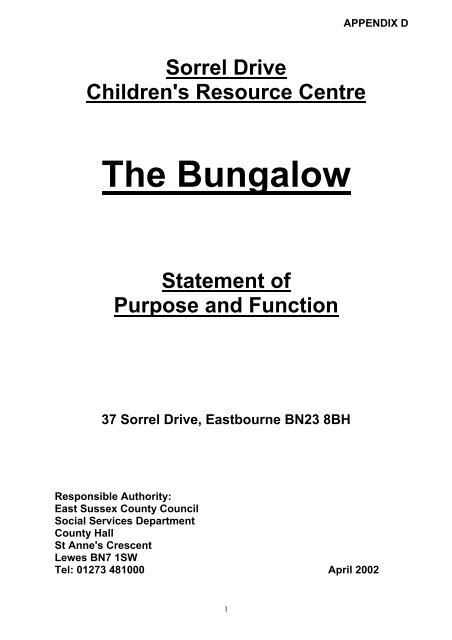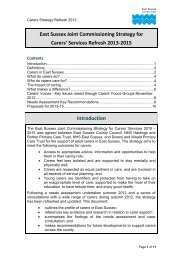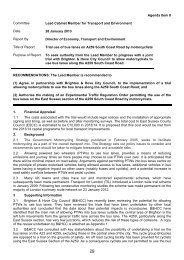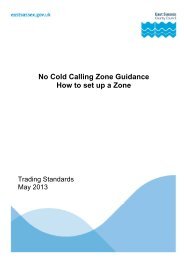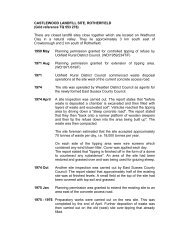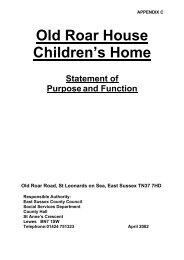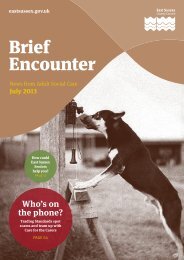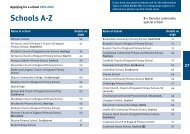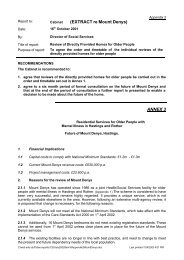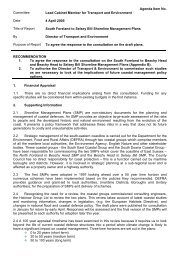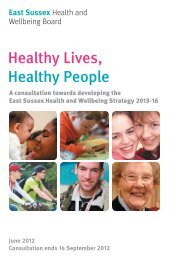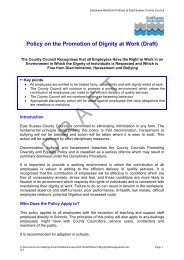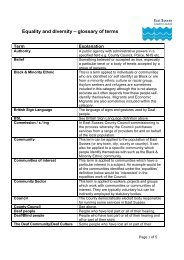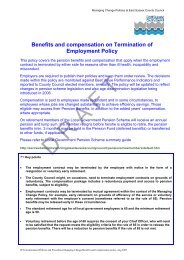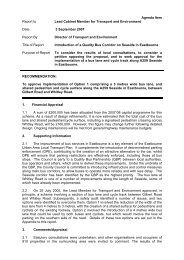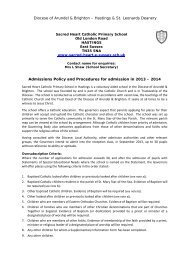The Bungalow - East Sussex County Council
The Bungalow - East Sussex County Council
The Bungalow - East Sussex County Council
Create successful ePaper yourself
Turn your PDF publications into a flip-book with our unique Google optimized e-Paper software.
APPENDIX D<br />
Sorrel Drive<br />
Children's Resource Centre<br />
<strong>The</strong> <strong>Bungalow</strong><br />
Statement of<br />
Purpose and Function<br />
37 Sorrel Drive, <strong>East</strong>bourne BN23 8BH<br />
Responsible Authority:<br />
<strong>East</strong> <strong>Sussex</strong> <strong>County</strong> <strong>Council</strong><br />
Social Services Department<br />
<strong>County</strong> Hall<br />
St Anne's Crescent<br />
Lewes BN7 1SW<br />
Tel: 01273 481000 April 2002<br />
1
Establishment<br />
<strong>The</strong> <strong>Bungalow</strong><br />
Operations Manager<br />
– Residential<br />
Antony Julyan<br />
Address<br />
Registered Provider<br />
Helen Davies<br />
Assistant Director,<br />
- Children & Families,<br />
Social Services Department,<br />
<strong>County</strong> Hall,<br />
St. Anne’s Crescent,<br />
Lewes,<br />
<strong>East</strong> <strong>Sussex</strong>.<br />
BN7 1SW<br />
Telephone: 01273 481000<br />
Registered Manager<br />
Paul Taylor<br />
Contact<br />
37 Sorrel Drive, 01323 762024<br />
<strong>East</strong>bourne,<br />
<strong>East</strong> <strong>Sussex</strong>.<br />
BN23 8BH<br />
Core Statement<br />
“<strong>The</strong> <strong>Bungalow</strong>” at Sorrel Drive Children’s Resource Centre provides respite care for<br />
up to seven young people of either gender between the ages of 10 and 19. <strong>The</strong><br />
resident group comprises young people who have severe learning and/or physical<br />
disabilities.<br />
2
1. Operational Policy<br />
1.1 <strong>The</strong> <strong>Bungalow</strong> is a residential unit which forms part of Sorrel Drive<br />
Children’s Centre. It is an integral part of the residential<br />
accommodation service for <strong>East</strong> <strong>Sussex</strong> <strong>County</strong> <strong>Council</strong> Social<br />
Services’ Dept. embracing recommendations as described in the<br />
Quality Protects agenda and provides services to young people and<br />
their families across the county.<br />
1.2 <strong>The</strong> <strong>Bungalow</strong> is registered with the National Care Standards<br />
Commission and complies with the national minimum standards. It<br />
operates within the Children Act 1999 and the Children’s Homes<br />
Regulations 2001. Alongside this, the <strong>Bungalow</strong> complies with the<br />
operational policies, guidance and instructions laid out by <strong>East</strong> <strong>Sussex</strong><br />
Social Services Department.<br />
1.3 <strong>The</strong> <strong>Bungalow</strong> has a clearly definable admissions procedure, which<br />
provides a firm structure to the case planning process. It also ensures<br />
that realistic timescales are identified and agreed for a young person’s<br />
stay within the <strong>Bungalow</strong>.<br />
1.4 <strong>The</strong> management structure and the <strong>Bungalow</strong>’s internal scheme of<br />
delegation is clearly defined and ensures that effective decision-making<br />
in relation to the needs of the young people within the <strong>Bungalow</strong> is<br />
made. It is a management task to assess that placements are<br />
appropriate given the needs of the young person, taking into account<br />
the mix of residents currently within the <strong>Bungalow</strong>. Clear and firm<br />
expectations of the placing social worker during the initial placement<br />
phase, increases the likelihood of meeting targets consistent with the<br />
care plan objectives and that any placement drift will be highlighted and<br />
resolved at an early stage.<br />
1.5 <strong>The</strong> <strong>Bungalow</strong> aims to provide a caring and comfortable environment in<br />
which a young person can feel safe and secure. <strong>The</strong> key principle<br />
enshrined within the <strong>Bungalow</strong>’s operational ethos is that residential<br />
care can be a positive experience, which offers an opportunity to be<br />
both creative and innovative within the care planning process.<br />
1.6 <strong>The</strong> core concepts for practice within the <strong>Bungalow</strong> are based upon a<br />
clear planning, intervention and evaluation. All young people admitted<br />
to <strong>The</strong> <strong>Bungalow</strong> are participants within this process, which provides<br />
the foundation for individual care planning at all levels of their period of<br />
accommodation.<br />
1.7 <strong>The</strong> health of a young person is considered of paramount importance<br />
and to support this, the services of a General Practitioner, Clinical<br />
Nurse Specialist and local Health Centres are available to the unit to<br />
help support staff, young people and their families and contribute to<br />
effective and cohesive teamwork<br />
3
1.8 Whilst we do not offer formal education within the <strong>Bungalow</strong>, staff<br />
members, in conjunction with parents and social work colleagues,<br />
remain proactive in attempting to secure formal education in a<br />
recognised establishment within <strong>East</strong> <strong>Sussex</strong>.<br />
1.9 <strong>The</strong> philosophy and care culture within the <strong>Bungalow</strong> actively promotes<br />
the notion of protection of individuals rights. All residents are<br />
encouraged to participate in activities outside of the centre and to<br />
maintain family contacts on a regular basis. All young people have<br />
unsupervised access to a telephone.<br />
Information from <strong>East</strong> <strong>Sussex</strong> Social Services Department’s<br />
Complaints Department at <strong>County</strong> Hall is easily accessible to young<br />
people within the Home.<br />
1.10 Emphasis is given to ensuring an effective and efficient service is<br />
maintained via comprehensive quality assurance systems. As required<br />
in the Departmental Best Value Performance Plan, systematic user<br />
feedback is obtained in order to measure outcomes.<br />
1.11 <strong>The</strong> Warner recruitment process is rigorously observed to for all care<br />
staff appointments and the TOPPS induction programme is in place for<br />
all new recruitment’s. Individual and team development plans are seen<br />
as crucial to our work and these are processed through regular<br />
supervision, personal development systems, individual training profiles<br />
and a comprehensive training package.<br />
1.12 Comprehensive Team Plans are clearly linked to Government<br />
agendas, in particular Quality Protects objectives. Our main service<br />
objectives fall under the following 5 headings:-<br />
• Promote learning and development opportunities for staff<br />
• Constantly strive to improve the quality of service we provide<br />
• Meet the health and educational needs of all young people we look<br />
after<br />
• To actively involve users in planning and delivery of service<br />
• To develop effective partnership with other agencies<br />
Specific practice standards are contained primarily in the following documents:<br />
Children’s Homes Regulations 2001<br />
<strong>The</strong> Children Act 1989<br />
<strong>The</strong> Children Act 1989 Guidance Volume 4<br />
<strong>The</strong> Children Act 1989 Guidance Volume 6<br />
Care Standards Act 2000<br />
Children’s Homes National Minimum Standards<br />
<strong>The</strong> Children (Leaving Care) Act 2000<br />
E.S.C.C. Departmental Operational Instructions<br />
<strong>East</strong> <strong>Sussex</strong> Child Protection Procedures<br />
4
Human Rights Act<br />
Health and Safety legislation<br />
Data Protection Act<br />
Social Services Best Value Performance Plan<br />
Quality Protects Management Action Plan<br />
2. Facilities<br />
“<strong>The</strong> <strong>Bungalow</strong>” is a place where young people live. <strong>The</strong>refore, it is our<br />
intention to provide as normal living surroundings as possible.<br />
2.1 Attention is paid to furniture, soft furnishings, equipment and fittings.<br />
This is with a view to creating a warm and relaxed atmosphere. We<br />
aim to provide a light and airy environment, which can give young<br />
people a sense of space and of not being hemmed in. <strong>The</strong> main living<br />
area has enough space and facilities to promote activities and<br />
relaxation via listening to music, watching videos, indoor games and<br />
arts and crafts activities such as painting and drawing.<br />
2.2 Each young person has their own bedroom which is personalised with<br />
familiar objects, toys, pictures and posters so that the young person will<br />
be able to identify what is their own space.<br />
2.3 On the same campus at Sorrel Drive we are lucky enough to offer the<br />
following facilities:<br />
• A Snoezelen room which offers a variety of stimulating sensory<br />
activities, such as bubble tubes, a ball pool, music and soft<br />
furnishings.<br />
• A large playroom complete with exploratory equipment for young<br />
people, such as tunnels, a small climbing frame, physiotherapy<br />
balls and go-kart.<br />
• A hydrotherapy pool where young people have the opportunity to<br />
enjoy swimming and water – obviously with a high staff presence.<br />
• <strong>The</strong> <strong>Bungalow</strong> also has a large garden which is used as often as<br />
possible in good weather. In very good weather the young people<br />
will eat “al fresco” at the picnic table in the garden,<br />
• Additionally the <strong>Bungalow</strong> has an adapted bus which can transport<br />
the young people out into the community to partake in any activities<br />
or events which mainstream young people would enjoy.<br />
2.4 Sorrel Drive has seven bedrooms, each has the facility for an overhead<br />
hoist to be fitted so that non-ambulant young people can be safely<br />
moved from bed to wheelchair and vice versa. All the doorways and<br />
corridors are wide enough to ensure wheelchair access and “<strong>The</strong><br />
<strong>Bungalow</strong>” has a well-provisioned bathroom which includes an Elysee<br />
bath, shower tray, shower chair and Potterton toilet chair. All these are<br />
accessed via an ‘H’ track hoisting system.<br />
5
2.5 <strong>The</strong> only circumstances where young people would be placed together<br />
in a bedroom would be if they were part of a sibling group and the<br />
sharing of a bedroom was appropriate.<br />
2.6 Staff will undertake physiotherapy exercises with some young people.<br />
However, these are exercises prescribed by a physiotherapist external<br />
to Sorrel Drive but carried out by staff members.<br />
3. “<strong>The</strong> <strong>Bungalow</strong>” Staffing Structure<br />
Operations Manager<br />
|<br />
Unit Manager<br />
|<br />
2 Resource Officers<br />
| | | |<br />
14 2 1<br />
Senior Care Night Care Admin 1 Driver/Handyman Relief Care<br />
Officers Officers Asst. Officers<br />
2 p/t Cleaners<br />
1 p/t Cook<br />
4. Staff Qualifications - Experience<br />
NAME<br />
Antony Julyan,<br />
Service Manager<br />
Paul Taylor,<br />
Unit Manager<br />
QUALIFICATIONS<br />
20 years residential experience<br />
NVQ Internal Verifier Award 1999<br />
Certificate in Social Services 1985<br />
17 years residential experience<br />
Certificate in Social Care 1988<br />
(Lewes Tertiary College)<br />
Institute of Management Certificate 1997 (University of<br />
Brighton)<br />
Diploma in <strong>The</strong>rapeutic Child Care<br />
1999 (Exeter University, Caldecott College)<br />
NVQ Assessors Award – Caring for Children & Young People<br />
1999<br />
6
Melanie Ross – Resource<br />
Officer<br />
Ann Crabb – SCCO<br />
(Nights)<br />
Gill Gausden – SCCO<br />
Tony Hines – SCCO<br />
Nikki Ransom – SCCO<br />
Janet Osborne – SCCO<br />
Christine Scutt – SCCO<br />
19 years residential experience<br />
Certificate in Social Services 1984<br />
Child Protection 2 1995<br />
Child Protection & Children with Disability 1996<br />
Supervision Training 1996<br />
17 years residential experience<br />
Lifting/Handling<br />
9 years residential experience – children with disabilities<br />
NVQ3 Caring for Children & Young People – commenced 2000<br />
Child Protection 1 & 2 1993<br />
Halliwick Method – swimming therapy 1992<br />
ASA Swimming Teacher Cert. 1990<br />
3 years Psychiatric residential experience<br />
First Aid Lifting/Handling<br />
9 years residential experience<br />
NVQ Level 3 – Caring for Children & Young People 2000<br />
Child Protection 1 & 2 1993<br />
First Aid Lifting/Handling<br />
19 years residential experience<br />
NVQ level 3 Caring for Children & Young People 2000 Child<br />
Protection (Signs & Indicators) 1998<br />
13 years Home Help / 8 years Residential experience<br />
<strong>East</strong> <strong>Sussex</strong> Social Care Course, Lewes Tertiary College 1993<br />
Child Protection 1 1993<br />
BTEC GNVQ3 Health & Social Care 1996<br />
Child Protection Foundation 1998<br />
Advanced Diploma in Child Care & Education 1998<br />
D32 & D33 NVQ Assessor’s Award 1999<br />
First Aid Lifting/Handling<br />
2 years Family Link Scheme<br />
3 years working with Elderly<br />
3 years Childminding<br />
Advanced Certificate in Counselling Skills & <strong>The</strong>ory, Central<br />
School <strong>The</strong>rapy & Counselling, London 1999<br />
Gordon Tinworth – SCCO 5 years working with Adults with Learning Difficulties (Special<br />
Needs)<br />
5 years Residential experience working with Children (Learning<br />
Disabilities)<br />
Child Protection 1 1997<br />
Child Protection – Working in Partnership 1997<br />
7
Paula Woodley – SCCO<br />
Rose Cooper – SCCO<br />
Melissa Crouch – SCCO<br />
Jo Stratford – RCCO<br />
Olive Clark – Cook &<br />
Domestic Assistant<br />
Bob Lewin –<br />
Driver/Handyman<br />
Brenda Goldsmith –<br />
Domestic Assistant<br />
Vaila Saunders – Admin<br />
Assistant<br />
6 years residential experience<br />
NVQ3 Caring for Children & Young People commenced in<br />
1999<br />
Child Protection 1 1996<br />
Lifting/Handling<br />
2 years Respite Home Care<br />
5 years Physio Assistant Children with Learning & Physical<br />
Disabilities<br />
2 years Residential experience (learning disabilities)<br />
Commenced NVQ – Caring for Children & Young People Sept<br />
2000<br />
5 years Residential experience (children & adults with learning<br />
disabilities)<br />
BTEC National Diploma in Social Care, Lewes Tertiary College<br />
1995<br />
BSL Stage One 1999<br />
BSL Stage 2 – commenced Sept. 2000<br />
Child Protection (Basic Awareness) 1998<br />
6 years residential experience<br />
2 years voluntary work<br />
Diploma in Nursing (Learning Disabilities), University of<br />
Brighton 1997<br />
Registered Nurse, Learning Disability<br />
BSL Level 1 2000<br />
BSL Level 2 – commenced Sept 2000<br />
12 years at Sorrel Drive<br />
Food Hygiene Course 1993<br />
First Aid Certificate 1996<br />
16 years at Sorrel Drive<br />
National Plant & pool Technicians Certificate 1993<br />
First Aid Appointed Person 1999<br />
14 years at Sorrel Drive<br />
Basic first aid 1996<br />
Lifting & Handling 1997<br />
13 years at Sorrel Drive<br />
ESCC Social Care 1 1991<br />
MS Word ’97 Introduction 1999<br />
MS Word ’97 Intermediate 2000<br />
Excel Training 1999<br />
Meetings/Agendas/Minutes 1998<br />
Word Processing 1996<br />
Customer Care 1995<br />
8
5. Staff Development<br />
5.1 <strong>The</strong> selection of staff is critical to the provision of a quality service and<br />
ensuring the protection and safety of young people accommodated.<br />
<strong>The</strong> <strong>Bungalow</strong>’s recruitment process is rigorous and challenging and in<br />
line with the “Warner” Committee report on staff recruitment and<br />
selection within residential units.<br />
5.2 Clear expectations are placed upon staff within the <strong>Bungalow</strong> in<br />
relation to their commitment towards achieving high standards of<br />
practice and care for service users. Strong emphasis is placed upon<br />
individual staff supervision and practice competency planning through<br />
the TOPPS induction and foundation process for all newly appointed<br />
staff.<br />
5.3 Every member of staff has a personal development review which<br />
measures their performance against departmental, and team plans and<br />
incorporates a development action plan for the year ahead. <strong>The</strong><br />
monitoring of PDS forms part of regular supervision and individual<br />
agreements are tailored to the needs of the individual supervisee and<br />
reviewed on a six monthly basis<br />
5.4 In addition to this, an active commitment is given to professional<br />
training and development through individual and team training<br />
programmes. A rolling programme is in place for all staff to achieve<br />
N.V.Q. Level 3, Caring for Children and Young People. On site we<br />
have 3 N.V.Q Assessors and one N.V.Q Internal Verifier.<br />
6. Services Provided<br />
6.1 <strong>The</strong> young people admitted to <strong>The</strong> <strong>Bungalow</strong> have very complex<br />
emotional and behavioural needs which invariably have led to multiple<br />
breakdowns in previous placements. <strong>The</strong>se will outweigh any<br />
disability. We aim to meet their psychological, social, emotional health<br />
and educational needs within a non-rejecting homely environment.<br />
6.2 In almost all cases, admission to the <strong>Bungalow</strong> will be planned and as<br />
such would have been subject to a pre-admission planning meeting<br />
involving the young person, parents and relevant professionals.<br />
Identification of the young person’s co-ordinator within the <strong>Bungalow</strong><br />
will have taken place prior to this meeting, ensuring that the primary<br />
service users are able to meet the co-ordinator within the residential<br />
setting before admission.<br />
6.3 Agreement as to the purpose and duration of the placement is<br />
confirmed at this pre-admission stage and emphasis is placed upon<br />
the social worker to provide relevant and accurate information within<br />
the “Looked After Children” framework.<br />
9
6.4 <strong>The</strong> core assessment model is primarily based on the Framework for<br />
the Assessment of Children in Need and their Families (HMSO<br />
2000)Assessment”<br />
6.5 A plan of intervention identifies targets for measurement which are<br />
regularly evaluated for their effectiveness. Individual care planning<br />
allows the opportunity to focus on outcomes from both the initial and<br />
ongoing process. This is formally monitored via the Looked After<br />
Children’s review process<br />
6.6 Additional services which could form part of a young person’s care<br />
plan include:-<br />
• Group work<br />
• Family work<br />
• Art/Play <strong>The</strong>rapy<br />
• Independence Training<br />
• Pre and post placement support work<br />
• Joint work with the Leaving Care Team<br />
• Joint work with the Fostering and Link Teams<br />
• Leisure and recreational activities<br />
All aspects of the service provided are within the context of achieving<br />
the aims of the care plan and meeting the identified needs of the young<br />
person.<br />
7. Referral and Admission Process<br />
7.1 It is the intention of the <strong>Bungalow</strong> to provide short-term respite care to<br />
young people with severe learning disabilities often combined with<br />
physical disabilities.<br />
7.2 Occasionally young people have stayed for longer periods of time<br />
when there has been a breakdown in their home care arrangements<br />
and there has been no suitable alternative accommodation available.<br />
However, it must be stressed that it was never intended to provide<br />
such a service at “<strong>The</strong> <strong>Bungalow</strong>”, as it is not considered to be in the<br />
best interests of any young person to be placed for a significant length<br />
of time in an environment with a constantly changing and residents<br />
group.<br />
7.3 In order to procure a service to “<strong>The</strong> <strong>Bungalow</strong>” for respite care the<br />
following process is followed:<br />
• Family/living placement agree with Social Worker and following an<br />
assessment that respite care is needed.<br />
• Social Worker presents a referral to the Disability Service Respite<br />
referrals monthly meeting.<br />
10
• If a service is agreed the parents/guardian and young person are<br />
invited to visit “<strong>The</strong> <strong>Bungalow</strong>”.<br />
• If the parents/guardian and young person are happy with what they<br />
see, a member of staff from the <strong>Bungalow</strong> will meet with the parents<br />
and young person to arrange a “Care Plan”. <strong>The</strong> Care Plan will<br />
give detailed relevant information about the young person’s needs<br />
during their stay. Any other relevant information from other<br />
agencies such as the young person’s school and other support<br />
services will be recorded in the Care Plan. Once the Care Plan is<br />
completed the parents/guardians will receive a copy. In this<br />
process the member of staff will:<br />
• Gain written permission for emergency medical treatment, if it is<br />
needed.<br />
• Explain the Medical Procedure endorsed by the Social Services<br />
Department.<br />
• Gain a written agreement from the parents endorsing the use of<br />
residential respite care.<br />
7.4 Wherever possible the young person involved will be encouraged to<br />
participate in this process.<br />
7.5 <strong>The</strong> young person will be invited for up to three “tea visits”. <strong>The</strong>se<br />
normally take place after school and give the young person an<br />
opportunity to spend a few hours in the <strong>Bungalow</strong> to acclimatise. If this<br />
transition is successful then the young person will come for an<br />
overnight visit.<br />
7.6 If the overnight visit is successful, i.e., the young person appears<br />
happy to stay, then the agreed amount of respite care can commence.<br />
7.7 <strong>The</strong> core principal of the unit mean that they are not primarily to be<br />
used for emergency admissions. However, the reality is that young<br />
people who have challenging behaviours and who are in placements<br />
(family or otherwise) that cannot meet their needs, will exhaust the<br />
placements to the point where it is untenable. In such situations there<br />
may be no where else to place a young person. <strong>The</strong>refore, emergency<br />
admissions can only be countenanced if:<br />
• Not to place a young person in the unit would render them<br />
homeless.<br />
• <strong>The</strong> young person meets the criteria for the unit they are to be<br />
placed in.<br />
• All other options have been explored (e.g. fostering, link extended<br />
family) and are not viable.<br />
• <strong>The</strong> placement is agreed at Operational Manager level or above.<br />
• <strong>The</strong> placement is reviewed urgently after the admission.<br />
• <strong>The</strong> underlying principal should be that emergency admissions are<br />
avoided.<br />
11
8. Involving Young People in the Running of <strong>The</strong> <strong>Bungalow</strong><br />
8.1 Young people’s views about the running of the home are actively<br />
sought in the following ways:-<br />
• House meetings.<br />
• Individual sessions with “preferred” members of staff.<br />
• Feedback at meetings/reviews.<br />
• Use of viewpoint software on computers.<br />
• Access to advocates via “Xpress”<br />
• Access to inspectors, <strong>County</strong> <strong>Council</strong>ors and Reg. 33 “off line<br />
inspector”.<br />
• Access to a complaints officer.<br />
8.2 All the staff involved in the running of the units are acutely aware of<br />
past mistakes and scandals involving residential care Nationwide.<br />
<strong>The</strong>y are committed to seeking and valuing young people’s feedback<br />
about their feelings and perceptions of the care they are receiving and<br />
how the home is functioning.<br />
9. Young People’s Rights, Representation and Complaints<br />
9.1 <strong>The</strong> <strong>Bungalow</strong> is visited by independent representatives either from<br />
Xpress Advocacy. <strong>The</strong> Unit is frequently visited by these<br />
representatives who give young people the opportunity to meet with<br />
them privately and confidentially to discuss any matters which the<br />
young person wishes.<br />
9.2 <strong>The</strong> allocated Social Worker is expected to visit regularly and a young<br />
person has a right to contact them. On admission, young people are<br />
informed of their rights, which includes their right to complain about<br />
aspects of the service being provided to them. All young people are<br />
encouraged to raise concerns in a positive way, with the intention of<br />
resolving difficulties. <strong>The</strong> Unit displays prominently the information<br />
relating to the Independent Representative and the Departmental<br />
Complaints Officer. Records of all complaints are kept, in line with<br />
departmental policy.<br />
9.3 If someone is particularly pleased or impressed by any aspects of their<br />
child’s care then they can report this verbally, or in writing to the<br />
<strong>Bungalow</strong> staff, Resource Officers or Unit Manager.<br />
9.4 We welcome any comments which may help improve the service<br />
provided in <strong>The</strong> <strong>Bungalow</strong>.<br />
9.5 In addition to the above, the <strong>Bungalow</strong> is inspected twice annually (one<br />
announced, one unannounced inspection) by the National Care<br />
Standards Commission.<br />
12
9.6 <strong>The</strong> <strong>Bungalow</strong> is also the subject of an unannounced visit once<br />
monthly by an appointed officer from the <strong>County</strong> <strong>Council</strong> but who does<br />
not work in the home. This is carried out in accordance with<br />
Regulation 33, Children’s Homes Regulations 2001.<br />
9.7 Additionally, the new legislation has added another dimension to<br />
complaints in that the National Care Standards Commission can also<br />
receive complaints from young people, staff, family members and<br />
others involved with young people of the home outside the home. <strong>The</strong><br />
NCSC can be contacted at Ivy Terrace, <strong>East</strong>bourne.<br />
9.8 Every resident has the right to pursue a normal pattern of life in the<br />
community, irrespective of the origin, status, ability, sex, age, creed or<br />
contribution to society.<br />
9.9 Every person has rights to self-determination, choice, responsibility,<br />
value and dignity. <strong>The</strong> home aims to provide an atmosphere where<br />
young people can experience a safe and caring environment.<br />
9.10 Research has proved that young people in care (Looked after Children)<br />
lose out on “life chances”. <strong>The</strong>refore the young people resident have<br />
the same rights and should have the same opportunities that any<br />
young person deserves. Any stigmatisation for Looked after Children<br />
must be avoided at all costs. “Quality Protects” objectives are a very<br />
useful reference point for this section i.e. that young people gain<br />
maximum life chances, are supported when leaving care, are securely<br />
attached to carers and are protected from significant harm.<br />
10. Health<br />
10.1 <strong>The</strong> unit actively promotes awareness for young people in relation to<br />
their health and general fitness. All staff encourage residents to take a<br />
responsible attitude towards their health and general welfare. Attention<br />
is given to general hygiene, personal care, exercise, diet and<br />
recreational activities.<br />
10.2 All young people have access to local G.P’s. Alternatively, where<br />
possible we endeavour to retain their own GP. Strong emphasis is<br />
based upon ensuring that a young person is subject to a medical upon<br />
becoming a resident and that dental and eye care checks occur. It is<br />
recognised that many young people with physical and learning<br />
disabilities often have complex medical needs. <strong>The</strong>refore, it is vital<br />
that prior to any admission a very clear protocol for a young person’s<br />
medical needs is in place in the young person’s Care Plan.<br />
13
10.3 Any medication needed for the young person during their stay is<br />
checked on admission. Medication must be prescribed from the young<br />
person’s G.P. and must be in its original packaging/bottle. If this<br />
procedure is not followed then it is possible the young person will not<br />
be admitted for respite care unless their medication is corrected<br />
immediately.<br />
10.4 Once the young person is resident, two staff on each shift will check<br />
and cross check medication times and quantities in order to ensure<br />
accuracy and safety. Any medication administered is recorded on the<br />
correct form in their Care Plan.<br />
10.5 In the event of a medical emergency, medical assistance, i.e. a Doctor<br />
or ambulance will be summoned immediately. <strong>The</strong> parent or guardian<br />
of the young person will also be informed of the situation as soon as<br />
possible.<br />
10.6 Young people who are suffering from contagious conditions such as<br />
chicken pox, scabies, etc. will not be admitted to “<strong>The</strong> <strong>Bungalow</strong>” until<br />
the condition has cleared up.<br />
10.7 If the young person has a change or addition to their medication, the<br />
staff at the <strong>Bungalow</strong> must be informed of this in writing.<br />
11. Promoting Education<br />
11.1 As carers for young people the staff have an obligation to support<br />
young people to attend and succeed to their potential in their schooling.<br />
Each young person will either have a Statement of Educational Needs<br />
or a Personal Education Plan which has the investment of all relevant<br />
parties and will outline what support is needed for each young person<br />
throughout their education.<br />
11.2 <strong>The</strong> following key principals underpin the ethos supporting a young<br />
person’s education.<br />
• All young people will be encouraged to attend school regularly.<br />
• Key workers will identify the named person at school with whom<br />
workers will liaise at any given time.<br />
• Any attendance issues will be dealt with promptly and the<br />
necessary people informed of non-attendance, i.e. school, parents,<br />
Social Worker.<br />
• Staff will ensure that a young person’s Individual Education Plan is<br />
understood and supported.<br />
11.3 Staff will actively encourage young people to complete homework,<br />
ensuring they understand what is being asked of them and assist in<br />
identifying any useful resources that could help.<br />
14
11.4 At other times staff should support and encourage young people to<br />
read as much as possible.<br />
11.5 Staff will ensure knowledge of any communications sent by the school<br />
in relation to after school clubs and activities as well as parent<br />
evenings. Young people resident in the <strong>Bungalow</strong> are expected to<br />
attend their usual school. Parents, social workers and bungalow staff<br />
are expected to liaise with the school to ensure that transport is<br />
arranged so the young person can attend.<br />
11.6 A “communication” book is a vital tool in letting school and parents<br />
know of any day-to-day events or significant incidents that have or will<br />
be occurring.<br />
11.7 Whilst there is a formal education offered via the school we also<br />
believe that “education” can also be seen in a broader context of young<br />
people learning from different activities and experiences outside of<br />
school.<br />
11.8 Facilities for homework or private study<br />
• Each young person has a room where they can go to complete<br />
homework, study or read.<br />
• Additionally each unit has at least one computer which young<br />
people can use to access information off the Internet or to use for<br />
word processing or constructing documents.<br />
11.9 Recreation sport and culture<br />
• <strong>The</strong> <strong>Bungalow</strong> has facilities which offer the opportunity for young<br />
people to enjoy music, television, indoor games, art, crafts and<br />
individual hobbies. <strong>The</strong> staff team are encouraged to explore<br />
outside opportunities for the young people to become involved in,<br />
such as football, scouts, brownies, swimming or any other activities<br />
or clubs young people belong to. This process is underlined by the<br />
ethos generated in Quality Protects and Social Inclusion. It is<br />
appreciated that children “Looked After” for a significant amount of<br />
time can become isolated and excluded from the community.<br />
11.10 If there are specific cultural issues, activities or anniversaries e.g.<br />
Christmas, <strong>East</strong>er, Ramadan, Divali which the young people have<br />
expressed an interest in or are directly culturally linked then the staff<br />
will ensure that they are celebrated and acknowledged.<br />
15
12. Maintaining Outside Contact<br />
12.1 Contact by family and other persons identified by the young person as<br />
important are actively promoted through visits home. Contact through<br />
correspondence and telephone is agreed with the young person’s<br />
Social Worker and ensures that any child protection issues are<br />
addressed and adhered to.<br />
12.2 Contact with Social Workers, legal advisers and independent visitors<br />
are unrestricted and private.<br />
12.3 We have a duty to maintain contact for young people in the <strong>Bungalow</strong>;<br />
however, we also have a duty to ensure that those who contact the<br />
young people are “safe” people who will not pose any threat to a young<br />
people emotional or physical wellbeing.<br />
13. Religious Observance<br />
13.1 On admission to the unit staff ensure that enquiries are made into<br />
religious and cultural background of each young person as part of the<br />
overall case plan. Special effort is made to help a young person make<br />
contact with a local church or group of adherents to the young person’s<br />
religion. Special privacy is afforded for the purpose of prayer during<br />
the day. We feel it is important that a young person recognises that<br />
every possible consideration is being given in respect of their religious,<br />
cultural and dietary needs.<br />
14. Reviews<br />
14.1 In order to promote the welfare of each young person, it is important<br />
that, when considering placement, there is a clear view as to what is<br />
hoped to be achieved by admission and how this fits into the overall<br />
care plan. If a young person is “looked after” for less than 120 days a<br />
year and for not more than four weeks at a time, the above pattern of<br />
reviews can be maintained. However, if this is not the case the above<br />
sequence will be changed as per instructions in Section 26 of the<br />
Children Act 1989.<br />
14.2 Statutory reviews held under Section 26 of the Children Act 1989.<br />
Service Review or case planning meetings are also held to ensure a<br />
young person’s welfare is safeguarded and promoted through<br />
comprehensive planning. <strong>The</strong>se meetings focus on a young person’s<br />
educational, behavioural, social, emotional and health needs and<br />
monitor how the placement plan is progressing in the context of<br />
achieving the overall care plan.<br />
16
14.3 All young people, parents and other interested parties are encouraged<br />
to attend. In the event of a young person not wishing to attend, the coordinator<br />
takes steps to ensure that any feelings or wishes that the<br />
young person may wish to have voiced at the meeting are presented<br />
and recorded. Also an Advocate may attend to represent the young<br />
persons views.<br />
14.4 <strong>The</strong> use of “Viewpoint” can also be used to help young people express<br />
their views at reviews. This can be done via either a document<br />
produced by the young person for each member of the review or a<br />
document to be used as an aide memoir for the young person in<br />
assisting their verbal feedback, if they are confident enough to do this.<br />
Additionally, Co-ordinators will also produce a written report in<br />
consultation with the young person for the planning meeting.<br />
14.5 <strong>The</strong> meeting will be recorded on the appropriate LAC review forms and<br />
any salient points will be recorded on the CRC6 forms in the young<br />
person’s file.<br />
15. Measuring Outcomes<br />
15.1 <strong>The</strong> <strong>Bungalow</strong> is a respite provision and intended to assist and advise<br />
parents and carers with the care and support of disabled young people.<br />
15.2 It is possible that young people may attend the <strong>Bungalow</strong> for several<br />
years as part of a rolling programme of respite stays.<br />
15.3 It is important that outcomes are considered for both the young person<br />
and their siblings and carers.<br />
15.4 Regular six monthly reviews are held throughout the duration of a<br />
young person’s involvement with the <strong>Bungalow</strong>, these provide an<br />
opportunity for discussion and feedback on outcomes for young people<br />
and their families.<br />
15.5 Young people have individual Care Plans giving details of their<br />
personal care and any programmes currently being followed. <strong>The</strong>se<br />
are regularly updated by co-ordinators in consultation with the young<br />
people and their parent/carers, these provide a useful indication of<br />
outcomes.<br />
16. Child Protection<br />
16.1 All unit staff receives training in the signs and indicators of abuse. <strong>The</strong><br />
staff members have key roles in identifying possible abuse and there<br />
are clear procedures, which they have to follow as set out by the <strong>East</strong><br />
<strong>Sussex</strong> Child Protection Committee.<br />
17
16.2 <strong>The</strong> underlying principles, which dictate practice in this matter, are:<br />
<strong>The</strong> <strong>East</strong> <strong>Sussex</strong> Child Protection Committee believes that:<br />
• Children are entitled to protection from neglect, abuse and exploitation.<br />
• A child’s welfare is the paramount consideration.<br />
• Working in partnership is the paramount consideration.<br />
• Working in partnership with families and supporting parental<br />
responsibilities are vital to the protection of children.<br />
• Child protection must take account of the racial, linguistic, cultural and<br />
religious needs and differences of families and children.<br />
• Personnel from different agencies must work together constructively.<br />
• Suitable forms of supervision and support are essential for persons<br />
who are formally responsible for protecting children.<br />
• Confidentiality is essential amongst agencies.<br />
16.3 If any member of staff is concerned about a young person’s well being<br />
they must inform the On-Call Manager.<br />
16.4 If for some reason a Resource Officer or the Unit Manager are not<br />
available during Office Hours then they contact - either Operations<br />
Manager.<br />
16.5 No form of bullying is acceptable within the <strong>Bungalow</strong>. Staff raise<br />
awareness of bullying by:<br />
• Dealing with bullying when it occurs.<br />
• Developing a culture in which respect and consideration for others<br />
is fundamental.<br />
• Developing staff understanding through induction and training.<br />
• Staff being vigilant and consistent.<br />
• <strong>The</strong> young person being able to report bullying and it being taken<br />
seriously.<br />
• Incidents being investigated and recorded.<br />
• Giving young people the opportunity to talk about bullying in general<br />
terms.<br />
17. Control and Discipline<br />
17.1 <strong>The</strong> Children Act 1989 Guidance and Regulations state: -<br />
“A major determinant of good behaviour and positive ethos of the home<br />
is the quality of the relationships between the staff and the children.<br />
Relationships between the staff and the children need to be based on<br />
honesty, mutual respect and recognised good professional practice.”<br />
18
17.2 <strong>The</strong> ethos of each unit emphasises that we believe the regulation to be<br />
correct and that our methods of work are planned accordingly. We<br />
stress the need for mutual respect and fairness, combined with clear<br />
consistent boundaries, which help establish a safe and caring<br />
environment. However, there will be times when disciplinary methods<br />
are necessary and the following sanctions are approved:<br />
• Restitution: i.e. the use of a proportion of pocket money to make<br />
restitution for damage, stolen money or goods, or to pay fines<br />
imposed by a court.<br />
• Reparation: i.e. where appropriate, making good or repairing any<br />
damage.<br />
• Curtailment of leisure extras.<br />
• Additional house chores.<br />
• Increased supervision.<br />
17.3 In reality it is extremely rare for a young person to be subject to formal<br />
disciplinary sanctions as the staff on shift will strive to de-escalate<br />
situations using diversion tactics. However, if a member of staff does<br />
need to impose such a sanction, then it must be clearly recorded in the<br />
“Control and Discipline” or “Sanctions” Book, and the action must be<br />
endorsed by the Manager.<br />
17.4 On occasions, physical restraint may be necessary to ensure the safety<br />
of all concerned.<br />
17.5 Physical restraint is only exercised as a last resort in the following<br />
circumstances: -<br />
When a young person is:<br />
• Likely to cause themselves physical harm.<br />
• Likely to cause another person physical harm.<br />
• Likely to cause serious damage to the fabric of the building and/or<br />
furniture or fittings.<br />
17.6 In every case, no more than the minimal necessary force is used within<br />
the shortest timescale possible to achieve the objective. <strong>The</strong> young<br />
person is given repeated opportunities to exercise their own self-control<br />
and the restraint is ceased at the earliest opportunity. <strong>The</strong> young<br />
person is talked through the incident, with the intention of ensuring they<br />
are fully aware of why it happened and what can be learned and<br />
understood from it.<br />
17.7 All incidents are fully recorded and monitored by the unit manager and<br />
discussed in detail at the following team meeting, in order to ensure<br />
that any practice issues are identified and rectified if necessary.<br />
19
18. Unauthorised Absence of Young People<br />
18.1 Upon discovering that a young person is missing, police may be<br />
informed immediately and a ‘missing persons’ form completed and sent<br />
by facsimile to the police. <strong>The</strong> following people are also informed:<br />
• Resource Officer<br />
• Children’s parents/guardian<br />
• Social Worker<br />
• Emergency Duty Service<br />
• Any other relevant person<br />
18.2 On return all relevant people are informed. <strong>The</strong> circumstances<br />
surrounding the absence will be investigated and discussed with the<br />
young person, to ascertain their whereabouts and activities whilst they<br />
were missing, with a view to helping the young person to keep<br />
themselves safe in the future.<br />
18.3 Every effort is made to return the young person safely and all incidents<br />
of going missing are collected centrally within the Department and<br />
subsequently transmitted to the National Missing Persons Help line.<br />
19. Electronic or Mechanical Surveillance<br />
19.1 No forms of electronic surveillance are used in any of the units save a<br />
“baby listener” at Sorrel Drive. This is a portable device, which can<br />
help alert staff (especially Night Care Officers) to a young person<br />
becoming distressed or suffering an epileptic fit.<br />
19.2 All the bedrooms have call points, these are fitted to allow young<br />
people to summon assistance and do not have any surveillance<br />
facility.<br />
20. Fire Precautions<br />
20.1 <strong>The</strong> Unit is inspected by the <strong>East</strong> <strong>Sussex</strong> <strong>County</strong> Fire Officer to ensure<br />
that fire precaution conditions are satisfactory. We maintain the<br />
following: -<br />
• Adequate precautions are taken against risk of fire.<br />
• Adequate means of escape in the event of fire.<br />
• Adequate arrangements are made for detecting, containing and<br />
extinguishing fire.<br />
• Adequate arrangements are made for warning of an outbreak of fire<br />
and for evacuation in the events of fire.<br />
20
20.2 Fire drills are held at least monthly at different times of the day and a<br />
full record kept. No advanced warning is given. All staff are aware of<br />
the procedures to be followed in the event of a fire alarm sounding and<br />
these are explained to the young people at point of admission.<br />
Footnote:<br />
We trust that this booklet has been helpful and should you require any additional<br />
information, please do not hesitate to contact us.<br />
21


